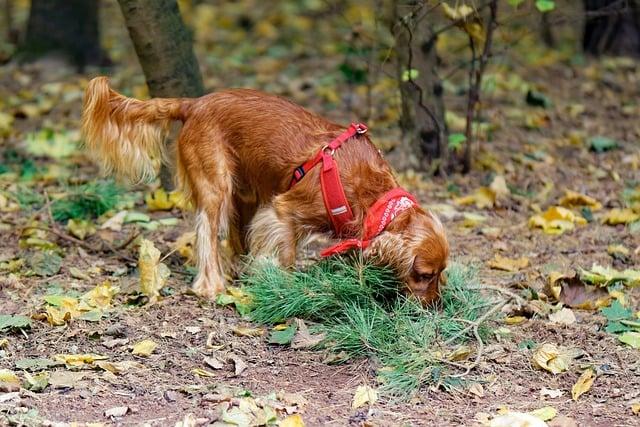Imagine coming home after a long day, greeted by your furry friend who can’t contain their excitement. As they shower you with affectionate licks, you might wonder: is this healthy? While dog saliva contains enzymes that can help heal wounds, it also harbors bacteria. A study suggests that the bond created through these licks can boost your mood and strengthen your relationship. However, moderation is key. To enjoy the benefits while minimizing risks, ensure your dog is healthy and up-to-date on vaccinations. Embrace the love, but stay informed!
Contents
- Understanding the Health Risks Associated with Dog Saliva
- Exploring the Benefits of Canine Affection and Bonding
- Best Practices for Safe Interaction with Your Dog
- Making Informed Choices for a Healthy Human-Canine Relationship
- Q&A
Understanding the Health Risks Associated with Dog Saliva
While many dog owners find comfort in their furry companions’ affectionate licks, it’s essential to recognize the potential health implications of this behavior. Dog saliva contains a variety of bacteria, some of which can be harmful to humans. Although most healthy individuals may not experience adverse effects, certain populations, such as young children, the elderly, and those with compromised immune systems, may be at a higher risk of infection.
Research indicates that dog saliva can harbor pathogens, including Capnocytophaga canimorsus, a bacterium that can lead to serious infections in humans. This bacterium is typically harmless to dogs but can cause severe health issues in susceptible individuals. Symptoms of infection may include fever, chills, and in severe cases, sepsis. It’s crucial for dog owners to be aware of these risks, especially if their pet has been exposed to other animals or has any underlying health conditions.
Moreover, while some studies suggest that dog saliva may have healing properties due to its antibacterial components, these benefits do not outweigh the potential risks. The presence of parasites, such as Giardia and Toxocara, in dog saliva can also pose health threats. These parasites can lead to gastrointestinal issues and other health complications if transmitted to humans through licking.
To minimize health risks, it’s advisable to establish boundaries regarding licking. Encouraging your dog to show affection in other ways, such as cuddling or gentle nudges, can help maintain a loving bond without compromising your health. Regular veterinary check-ups and maintaining good hygiene practices, such as washing hands after interacting with your pet, can further safeguard against potential infections. Ultimately, understanding these health risks allows dog owners to make informed decisions about their interactions with their beloved pets.
Exploring the Benefits of Canine Affection and Bonding
Canine affection is a powerful force that can enhance the bond between you and your furry friend. When your dog licks you, it’s not just a display of affection; it’s a form of communication that signifies trust and love. This behavior can lead to a deeper emotional connection, fostering a sense of security and companionship that is beneficial for both you and your pet. By allowing this natural expression of affection, you are reinforcing the bond that makes your relationship unique.
Moreover, the act of letting your dog lick you can have positive effects on your mental health. Studies have shown that interactions with pets can reduce stress and anxiety levels. The soothing sensation of a dog’s tongue can trigger the release of oxytocin, often referred to as the “love hormone.” This hormone not only promotes feelings of happiness but also strengthens the emotional connection between you and your dog. Embracing this behavior can create a calming atmosphere, making your home a more peaceful place.
In addition to emotional benefits, canine affection can also contribute to physical health. Dogs’ saliva contains proteins that can help heal wounds and fight infections. While it’s essential to maintain proper hygiene, occasional licking can introduce beneficial bacteria that may enhance your immune system. This natural exposure to your dog’s microbiome can promote a healthier lifestyle, making you more resilient to illnesses. It’s a unique way to experience the health benefits of pet ownership.
allowing your dog to express affection through licking can encourage positive behavioral traits. Dogs that feel loved and secure are less likely to exhibit anxiety or aggression. By nurturing this bond, you are promoting a well-adjusted pet that is more likely to respond positively to training and socialization efforts. This mutual understanding and respect can lead to a harmonious living environment, where both you and your dog thrive together.
Best Practices for Safe Interaction with Your Dog
When interacting with your dog, establishing safe and healthy boundaries is essential for both your well-being and your pet’s. Dogs express affection and communicate through licking, but it’s important to ensure that this behavior is safe and appropriate. Here are some best practices to consider:
- Know Your Dog’s Health Status: Regular veterinary check-ups are crucial. Ensure your dog is up-to-date on vaccinations and free from parasites, as these can be transmitted through saliva.
- Monitor Their Diet: A dog’s diet can influence their oral health. Feeding your dog high-quality food can help maintain a healthy mouth, reducing the risk of harmful bacteria that could be transferred through licking.
- Establish Boundaries: While it’s natural for dogs to lick, it’s important to set limits. Teach your dog commands such as “no” or “enough” to help them understand when licking is inappropriate.
- Practice Good Hygiene: After your dog licks you, wash your hands and any exposed skin. This simple practice can help minimize the risk of transferring any bacteria or allergens.
Understanding your dog’s behavior is key to fostering a safe environment. Dogs lick for various reasons, including affection, anxiety relief, or even boredom. By recognizing the context of their licking, you can better manage their behavior and ensure it remains a positive interaction. If your dog licks excessively, it may be a sign of stress or a need for more engagement, so consider providing additional mental and physical stimulation.
Furthermore, it’s essential to educate yourself about the potential risks associated with dog saliva. While many dogs are healthy and their saliva is generally harmless, certain conditions can pose risks. For instance, if your dog has been chewing on something unsanitary or has a dental issue, it could lead to the transfer of harmful bacteria. Always be aware of your dog’s habits and health to make informed decisions about interactions.
Lastly, remember that every dog is unique. What works for one may not work for another. Pay attention to your dog’s cues and adjust your interactions accordingly. Building a trusting relationship with your dog involves understanding their needs and respecting their boundaries, ensuring that both you and your furry friend can enjoy a healthy and affectionate bond.
Making Informed Choices for a Healthy Human-Canine Relationship
When considering the dynamics of your relationship with your dog, it’s essential to weigh the implications of allowing your furry friend to express affection through licking. While many pet owners find this behavior endearing, it’s crucial to recognize that it can carry both positive and negative aspects. Understanding these factors can help you make informed decisions that promote a healthy bond between you and your canine companion.
On one hand, dog licking can be a sign of affection and trust. Dogs often lick their owners as a way to show love and strengthen their social bond. This behavior is rooted in their instinctual habits, as puppies lick their mothers to solicit care and attention. However, it’s important to consider the context in which this licking occurs. If your dog is licking excessively or inappropriately, it may indicate anxiety or a need for attention, which could be detrimental to your relationship.
Moreover, hygiene is a significant factor to consider. Dogs explore the world with their mouths, and their tongues can harbor bacteria and parasites. While most healthy dogs have a relatively clean mouth, it’s wise to be cautious about where they’ve been and what they’ve licked before allowing them to lick you. To maintain a healthy interaction, consider the following:
- Regular veterinary check-ups: Ensure your dog is up-to-date on vaccinations and parasite control.
- Grooming: Keep your dog clean and well-groomed to minimize the risk of transmitting germs.
- Boundaries: Establish clear boundaries regarding when and where licking is acceptable.
Ultimately, fostering a healthy relationship with your dog involves understanding the nuances of their behavior and your comfort levels. By being mindful of the implications of licking, you can nurture a bond that is both affectionate and safe. Remember, the goal is to create an environment where both you and your dog feel secure and happy, allowing your relationship to flourish in a positive direction.
Q&A
-
Is it safe for my health if my dog licks me?
While dogs’ mouths contain bacteria, most of these are not harmful to humans. However, it’s essential to maintain good hygiene. Regular veterinary check-ups and vaccinations can minimize health risks, making occasional dog licks generally safe.
-
Can dog saliva transmit diseases to humans?
Yes, in rare cases, dog saliva can transmit certain diseases, such as parasites or infections. To reduce this risk, avoid letting your dog lick open wounds or your face, and ensure your pet is healthy and free from parasites.
-
What are the benefits of letting my dog lick me?
Dog licks can promote bonding and affection between you and your pet. They can also have a calming effect, reducing stress and anxiety for both you and your dog. This positive interaction can enhance your emotional well-being.
-
How can I maintain hygiene while allowing my dog to lick me?
To ensure hygiene, wash your hands after interacting with your dog, especially before eating. Regularly groom your dog and keep their living environment clean. This will help minimize any potential health risks while still enjoying the affectionate licks.
while the bond between you and your dog is invaluable, it’s essential to prioritize your health. Understanding the potential risks of allowing your dog to lick you can help you maintain a safe and loving relationship. Choose wisely for both your well-being and your furry friend’s!

大家好,我是彼得潘,專業的手法身體治療師。我喜歡探索和研究各種主題,並透過與人工智慧的合作分享專業、實用、有趣的文章。我們定期進行人工審核,以確保內容的準確性。如果您發現文章中有任何不準確的地方,請隨時與我們聯繫,我們會及時糾正。您可以透過 [email protected] 與我們聯繫。



